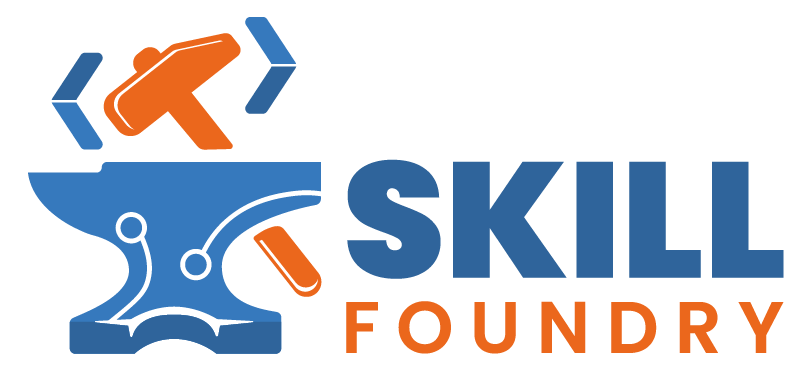Programming in Python for Beginners
Learn Python the hands-on way. From writing your first program to building real projects with files, functions, and data structures.
Join Skill Foundry
This course includes:
Prerequisites:
Overview
Curriculum
Mentor
FAQs
What we'll cover...
Why Learn Python?
Course Outline
Module 1: Getting Started
- We have a lot of interactives and other elements. Before you start, let's cover how to use them!
- Welcome to Python
- Navigating the Course
Module 2: Setting Up Your Environment
- Learn how to set up your development environment with Python, VS Code, and essential tools.
- How Applications Work
- File System Basics
- Terminal Basics
- Quickstart: Setting Up Your Coding Environment on Windows
- Installing Python (Windows, macOS, and Linux)
- Installing and Configuring Visual Studio Code
- Getting the Course Materials from GitHub
Module 3: Variables and Data Types
- Learn the fundamentals of Python variables, data types, and string manipulation.
- Variables and Comments
- Simple Data Types
- Getting Input from the Terminal
- Exercises: Terminal Input and Simple Types
- Solutions: Terminal Input and Simple Types
- Attributes and Globals
- A Deeper Look at Strings
- Exercises: Working with Strings
- Solutions: Working with Strings
Module 4: Conditional Statements
- Make decisions in your code with if statements and import Python modules to help with common tasks.
- If Statements
- Import Statements and Random Numbers
- Demo: Higher or Lower?
- Exercises: Exploring the Math Module
- Solutions: Exploring the Math Module
- Exercise: Temperature Conversion
- Solution: Temperature Conversion
Module 5: Loops
- Loops allow us to repeat code statements. We will demonstrate for and while loops with practical examples.
- While Loops
- Demo: Application Loops
- Exercise: Running Total
- Solution: Running Total
- For Loops
- Demo: Factors
- Demo: Multiplication Table
- Exercise: Fizzbuzz
- Solution: Fizzbuzz
Module 6: Lists and Sets
- Introduce Python's powerful collection types including lists and sets for managing groups of data.
- The List Type
- Demo: Dice Statistics
- Exercise: Restaurant Waitlist
- Solution: Waitlist
- Splitting and Joining Strings
- The Set Type
- Demo: Unique Words
- Exercise: Music Matchmaker
- Solution: Music Matchmaker
- Exercise: Forbidden Words
- Solution: Forbidden Words
- Exercise: The Guessing Game
- Solution: The Guessing Game
Module 7: Functions
- Code reuse is something professionals focus on. Learn to organize your code with functions and handle errors gracefully.
- Declaring and Using Functions
- Handling Errors
- Demo: Validated Input
- Exercise: Terminal Utilities
- Solution: Terminal Utilities
Module 8: Data Structures
- Learn to use advanced data structures including tuples, dictionaries, and basic object-oriented programming.
- Working with Date and Time Information
- Tuples
- Exercise: Recurring Meeting Scheduler
- Solution: Recurring Meeting Scheduler
- Dictionaries
- Demo: Dice Statistics 2
- Sorting Dictionary Elements in a List
- Exercise: Refactoring Restaurant Waitlist
- Solution: Refactoring Restaurant Waitlist
- Class Basics
- Exercise: Tic-Tac-Toe
- Solution: Tic-Tac-Toe
Module 9: Working with Files
- Learn to read, write, and manipulate different file formats including text, JSON, and CSV files.
- Text Files in Python
- Working with JSON in Python
- Exercise: Media List
- Demo: CSV Files
- Solution: Media List
Module 10: Pip and PyTest
- Discover Python package management and testing with pip, virtual environments, and pytest. The practice minis will give you dozens of short code exercises to reinforce the concepts we have learned so far.
- Packages and Virtual Environments
- Demo: Understanding Namespaces
- Unit Testing with pytest
- Exercise: Practice Minis
Module 11: Capstone
- Apply everything you've learned in a comprehensive capstone project and plan your next steps.
- Capstone: Locker Rental Kiosk
- Solution: Locker Rental Kiosk
- Next Steps
How We Build Developers
Write your awesome label here.
Written Lessons That Actually Make Sense
Our written content explains complex concepts in plain English, with real examples you can quickly apply. You'll understand not just what to do, but why pros make the decisions we do.
Write your awesome label here.
Hands-On Practice That Builds Confidence
Every concept comes with code samples and exercises. You can't learn to play guitar without putting your fingers on the strings and you can't learn to code without writing a lot of code!
Write your awesome label here.
Videos That Show, Don't Just Tell
You'll see how professional developers think, debug, and refactor code. These aren't just lectures, but applied theory. See concepts actually used together!
Write your awesome label here.
Rigorous Capstone Projects That Prove Your Skills
You'll build substantial applications that demonstrate your ability to architect solutions, handle complexity, and deliver professional-quality code.
Join developers who chose...
depth over speed,
understanding over memorization, and
professional skills over participation certificates.
Frequently asked questions
Do I need any coding experience to take this course?
Not at all! This course is designed for absolute beginners. We walk you through fundamentals of how computers and applications work, setting up your development environment, and writing your first "Hello, World" program before getting into the "meat".
Should I learn Python or C# first?
It depends. (No really, it depends!)
If you've never tried coding before and want a gentle introduction with forgiving syntax, then Python is a great place to start learning. You'll focus on problem-solving and core programming logic without getting overwhelmed by complex rules, which builds confidence and keeps you motivated early on.
If you want a deeper dive into programming concepts from the start, then beginning with our C# pathway is excellent and learning Python later will be downright easy because of the solid foundations C# provides. C#'s structured approach teaches you disciplined programming habits and deeper computer science concepts upfront. Either way, you'll want both languages in your toolkit as a professional developer because hybrid teams are increasingly the norm. It's really about which learning style fits you better.
If you've never tried coding before and want a gentle introduction with forgiving syntax, then Python is a great place to start learning. You'll focus on problem-solving and core programming logic without getting overwhelmed by complex rules, which builds confidence and keeps you motivated early on.
If you want a deeper dive into programming concepts from the start, then beginning with our C# pathway is excellent and learning Python later will be downright easy because of the solid foundations C# provides. C#'s structured approach teaches you disciplined programming habits and deeper computer science concepts upfront. Either way, you'll want both languages in your toolkit as a professional developer because hybrid teams are increasingly the norm. It's really about which learning style fits you better.
What kinds of projects will I build?
You’ll complete dozens of mini-practice exercises, games like Tic-Tac-Toe, and a full capstone project: a Python-powered Locker Rental Kiosk with real file and data handling.
Will I learn to write professional-quality Python code?
Yes! You’ll not only learn basic syntax, but also how to structure your code, use functions, handle errors, and even write tests with Pytest. These are the skills real developers use every day.
What if I get stuck? Is there support?
Yes! Your Skill Foundry membership includes access to our private Discord community where you can ask questions, get help, and connect with peers and mentors.
Is this course included in my Skill Foundry subscription?
Yes! The entire Python course, all exercises, and every solution are fully included in your membership.
Will this course help me start a tech career?
It’s a great first step. Python is used everywhere, from web development and automation to data science and AI. This course gives you the foundation to explore any of those paths with confidence. It is the "true zero" starting point.
About the Author
Eric Wise
Software Architect | Mentor | Entrepreneur
Eric isn't just another online instructor, he's a veteran software architect, multi-time tech entrepreneur, and someone who's been in every corner of the industry from tech start ups, big corporations, and freelancing.


